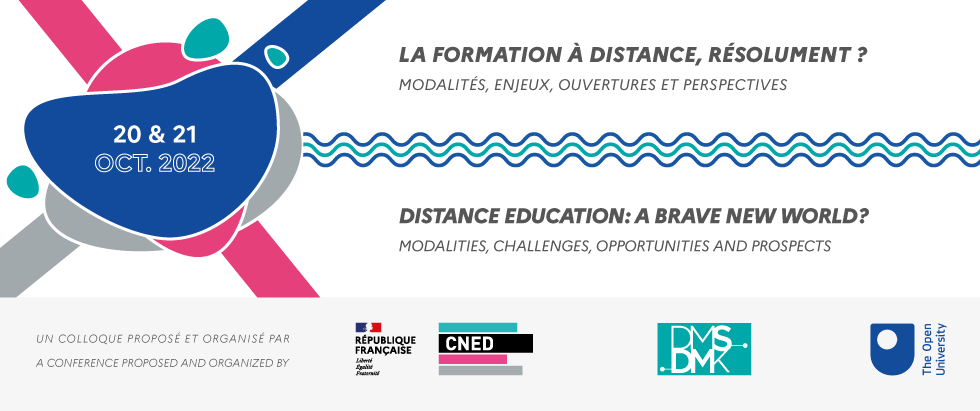
Navigation
SUPPORT
|
La formation à distance, résolument ? Modalités, enjeux, ouvertures et perspectives Le Centre National d’Enseignement à Distance (CNED) à travers son École d’ingénierie de la formation à distance (EIFAD), la revue scientifique Distances et Médiations des Savoirs (DMS) et l’université britannique The Open University organisent un colloque international bilingue sur les enjeux et les perspectives de la formation à distance pendant et après l’épidémie de covid-19: La formation à distance, résolument ? Le colloque aura lieu en ligne les 20 et 21 octobre 2022. Depuis la fermeture, en mars 2020, des établissements scolaires et universitaires imposée par les gouvernements du monde entier pour endiguer la pandémie de la Covid, l’utilisation des outils et plateformes numériques est devenue l’unique manière d’assurer la continuité de l’enseignement et des apprentissages. Ainsi une formation à distance d’urgence s’est-elle partout, brutalement et durablement, imposée aux enseignants, aux apprenants et à ceux qui, avec eux, mettent en œuvre des activités de soutien, de documentation, d’orientation, d’administration et de support logistique. Cette expérience en temps et en grandeur réels a connu des succès et des échecs. Elle a mis l’accent sur la diversité des modalités de formation à distance mises en œuvre, sur leur efficacité relative, sur les enjeux propres aux options privilégiées, sur les perspectives qu’elles ouvrent et sur leur éventuelle pérennité. Elle semble également avoir profondément modifié les représentations qu’au sein des organisations éducatives et en dehors d’elles, chacun se fait de la formation à distance, de ses avantages et de ses inconvénients, des contraintes qu’elle impose et des possibilités qu’elle ouvre. Par ailleurs, cette expérience a transformé la question de la médiation à distance des savoirs, jusqu’alors question réservée à des spécialistes, en un problème d’intérêt public, largement médiatisé et commenté à l’échelle internationale dans la presse et sur les réseaux sociaux. Elle est même devenue un enjeu de prestige national, permettant à certains pays de faire valoir une flexibilité dont les autres n’ont pas été capables. Enfin, cette expérience a mis à rude épreuve le fonctionnement des opérateurs traditionnels et redistribué les cartes entre secteur public et secteur privé, supports spécialisés et outils d’information et de communication grand public ; elle a accéléré le développement des Edtech et renforcé à une échelle inédite les processus d’industrialisation et de privatisation de l’éducation. Ce colloque est organisé par deux acteurs historiques du domaine, le Centre national d’enseignement à distance et l’Open University, à l’initiative et avec le soutien de la revue Distances et médiations des Savoirs. Son ambition est d’esquisser un bilan scientifique de ce qui s’est passé aux différents niveaux qui viennent d’être évoqués. L’approche du colloque, en lien avec les perspectives de DMS, favorise l’ouverture. À la fois pluri et interdisciplinaire, il portera sur les thématiques dont la liste ci-dessous n'est pas exhaustive :
Le colloque s’adresse aux formateurs[1], enseignants chercheurs, ingénieurs et conseillers technopédagogiques, aux professionnels de la formation, aux praticiens, aux responsables d’entreprises, aux décideurs du domaine, aux étudiants et, de façon générale, à tous ceux qui sont attentifs aux évolutions des métiers et pratiques de la formation et, notamment, de la formation à distance. Les propositions de communication et les interventions seront en langue française ou anglaise. Le colloque sera entièrement bilingue. [1] Le masculin est utilisé sans discrimination et uniquement dans le but d’alléger le texte. |

